Written by Mike Cervantes 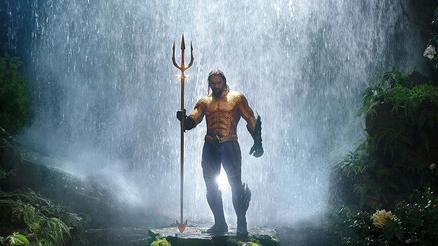 There’s an interesting dynamic going on within the Snyder-originated DC cinematic universe at this time. The want to mirror the success of Marvel’s highly successful universe has led there to be a movie where Batman battles Superman, and several superheroes collaborate to do battle with a single threat, but the most popular movies of the bunch have remained the ones where we are seeing the origins of these characters for the very first time. Seeing the mythic origins of Wonder Woman in her 2017 film, and seeing Aquaman in this film, have made for the most rejuvenating films of the Snyder-verse, but then, I suppose, they then have to take a break from that so they can help BATMAN do something...and then we have to take another break from THAT to watch Batman’s presumed villains form another SUICIDE SQUAD….What a drag. The side-effect that the Snyderverse has on this film is fundamental to the character of Arthur Curry/Aquaman, played here once again by Jason Momoa. This Aquaman has already effectively saved the world once, in 2017’s Justice League, and has accomplished that while still being a land-dwelling Atlantean without an eighth of the power he has in the comics or any other media. After an introductory detour where we learn about Aquaman’s parents, Thomas Curry (Temuera Morrison) and Atlanna (Nicole Kidman), a conflict immediately rises when Aquaman’s full-blood half-brother Orm Marius, or Ocean Master, as the movie immediately reminds you, dumps all the ocean’s garbage on the land as a preemptive strike in a war he wishes to have against land dwellers. While Ocean Master scrambles to place every sentient form of ocean life under his dictatorial heel, Aquaman is slowly convinced by King Nereus’ daughter Mera (Amber Heard, also reprising her role from Justice League) to seek the Trident of Atlan, a magical weapon once owned by Atlantis’ most benign ruler. Aquaman is, of course, reluctant to go out of his way to procure something that seems like it’s just a token of royalty, and at first takes the fight directly to Orm, who predictably wipes the floor with him. Meanwhile, Aquaman is being hunted by an oddly nationless pirate named David Kane (Yahya Abdul-Mateen II), who is seeking revenge, as Aquaman left his father to die on a sub they were pirating. The film unfolds in a completely predictable manner. There are scenes where Mera helps the wayward Aquaman appreciate the Atleantean way of life, followed by detours where Arthur does the same for her as she first visits the land. There are flashbacks to Aquaman’s upbringing, peppered by moments where he’s given limited-run Atlantean training by Vizier Nuidis Vulko (Willem Dafoe), and of course the mystic trials that reveal that the Trident they are seeking is more than just an undersea insignia ring. Of course, the nadir of Aquaman’s ability to surpass Orm’s iron-fisted rule is that he is not just a king, he is a hero… 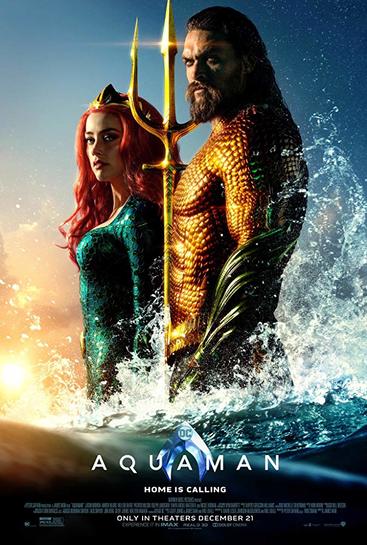 It is all pretty paper-doll, cookie cutter, peanut butter and jelly superhero subtext, but still much appreciated because we all know…it could have been Justice League. There are a few moments that breach even the flimsy path of realism the film provides, like the fact every subtle romantic moment is interrupted by a literal explosion. Did Arthur and Mera almost kiss? Oh well. KABOOM! Then there’s the moment when Mateen’s Kane puts on the oversized helmet of his comic counterpart, Black Manta, and he loses all semblance of the urbane, angry, Earth-dwelling pirate he plays though the movie to become a wholly CG, Darth Vader-esque…mirror to his comic counterpart. More than anything, I have to applaud this movie for its pacing. I’ve always believed that these superhero flicks live and die based on their ability to cover their often universally heady ground without making the audience squirm in their seats cringing, and Aquaman accomplishes this fluidly. It’s the ability of this film, and Wonder Woman, once again, to make the viewer a part of its fantastical setting, which makes this the highlight of the overall DC cinematic universe so far. We’re not just stitching together quilts made partially out of The Dark Knight Returns and Death of Superman here. We are taking the time to build a foundation using the lore to tell stories of DC superheroes who up until this point haven’t had the opportunity to follow in the footsteps of their more popular contemporaries. So, this is a very good film. Highly recommended, and definitely worth a watch in the theaters. The future of this series of films is still up in the air, or rather, awash in a sea of directors’ different Joker vanity projects, but once again this proves to be a solid first entry into what will hopefully lead to a future of a particular superhero’s cinematic adventures.
0 Comments
Written by Zeke Perez Jr. 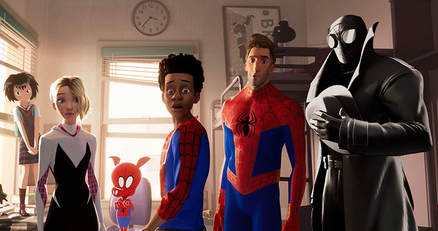 The best superhero movies are those that inspire you to believe in something greater. You leave the theater feeling like a little kid again, wanting to don a mask and fight any evil you come across. The best comic book movies make you want to rush to your local comic shop and read everything you can about the characters you just saw. The best animated movies heighten your imagination and fill your world with color. Spider-Man: Into the Spider-Verse is the perfect combination of each of those qualities. It’s as inspiring as a superhero movie has ever been, it’s the truest comic book adaptation yet, and it’s an ambitious and visually-stunning animated film. Spider-Verse thundered out of the gate, swinging into the top spot in the box office and already notching a Golden Globes nomination for Best Animated Feature. All the praise is well founded. It’s a must-see movie this holiday season. The movie focuses on Miles Morales and a cast of five other Spider-People from alternate dimensions (Peter Parker, Gwen Stacy/Spider-Gwen, Peni Parker, Spider-Man Noir, and Peter Porker/Spider-Ham), brought together after Kingpin built a particle accelerator to connect parallel universes. The team works to disable the accelerator and fight off Kingpin and a collection of notorious villains. Into the Spider-Verse delivers a fun, fast-paced, meaningful story that does everything a superhero tale should. It checks the boxes for action, plot, heroes, villains, and adventure. It’s self-aware, humorous, and fun. And it brings home the most touching message from a Spider-Man movie yet. Not the one about ‘great power’ that you’ve heard before, but one that makes you believe that anyone can be behind the mask and anyone can be the hero the world needs. One of the things it really gets right is its character depth. It truly makes you care about half-a-dozen Spider-Heroes plus a full cast of supporting players and villains, which is not an easy task. Each character gets their own quick backstory that is entertaining, endearing, and plays off the comic book theme. We’re also treated to a badass and fearless version of Aunt May, and to a set of Spider-Man villains that feel new – either literally in their appearance or in how the actors portrayed them. The movie allows its star character to shine the brightest. The audience grows attached to Miles right from the very first scenes that it gets to spend with him. Simple ‘day in the life’ scenes showing him with his family and friends, at school, or mumbling through the lyrics to a catchy song (as we all have done) easily win your heart. Miles’ transition into the next iteration of Spider-Man is a terrific origin, too. Growing up in a universe where Peter Parker’s Spider-Man is infamous, Miles already has some context to help him understand the changes happening after a radioactive spider bite. Shortly after being bitten, he gets to be a proverbial spider on the wall observing a Peter Parker fight as he begins his journey in learning to adapt to his powers. 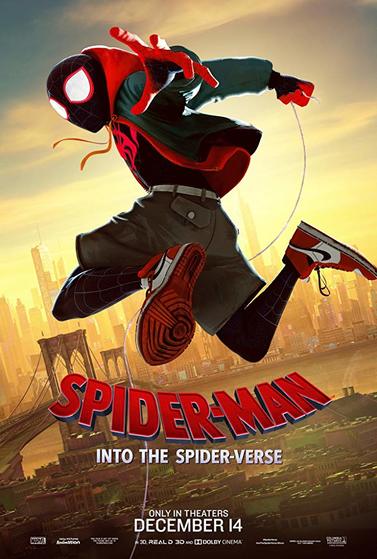 Fans of comics and the comic universe generally will find the movie to be a treat. It really is a top contender to be the best comic book movie in all senses of the phrase. The way that it’s framed and presented are evidence of that. From the occasional use of comic panels as a transition between scenes to the playful appearance of thought bubbles and comic book action words, it’s like a comic collection come to life. It features countless references to Spidey comics, movies, shows, and games, with Easter-eggs including nods to various Spider-Man suits, to key moments in history, and to Spidey comic creators (like Ditko, Bendis, and Romita, just to name a few). The unique art style of Into the Spider-Verse pairs perfectly with the story that the filmmakers were trying to tell. Whereas traditional 2D animation would have felt too flat and where live action would have been too CGI-heavy or too cheesy, the art in Into the Spider-Verse allows for comic book style action, humor, and visuals. It takes a short adjustment period to get used to the different look and feel of the movie, but it feels smooth and refreshing once you get rolling. The filmmakers succeeded in trying something new, especially with how well their approach meshes with this particular movie. I feel like I could go on forever talking about this movie, so I’ll wrap up with a few random intangibles that I loved. First, the look, feel, and substance of the movie is complemented perfectly by its sound. The film’s soundtrack both epitomizes Miles as a person and emphasizes the intensity of the action scenes. Next, given the message of the movie and real-world circumstances, this has to have been the most touching and poignant Stan Lee cameo yet (albeit with Stan’s usual humor still shining through). Last but certainly not least, the diversity in the movie was powerful. As was the case with Wonder Woman and Black Panther, it was invigorating to see new types of heroes represented. Seeing Miles’ connection to his African-American father and his Spansih-speaking Latina mother was a treasure. Anyone can be a hero, and that is now being shown on the big screen. 2018 has been an outstanding year for Spidey fans. We got to *thwip* our way through a beautiful story and gorgeous landscape in Marvel’s Spider-Man on PS4. Several great Spider-Man comics are in circulation, including Spencer and Ottley’s The Amazing Spider-Man and Ahmed and Garron’s new Miles Morales series. And now this, the most perfect Spider-Man movie to date. Spider-Man: Into the Spider-Verse brings together a heartfelt story, great characters, stunning visuals, and everything you love about Spider-Man to create a harmonious concert that Stan Lee and Steve Ditko would have been proud of. Swing by your friendly neighborhood theater to see it as soon as you can. Written by John Edward Betancourt 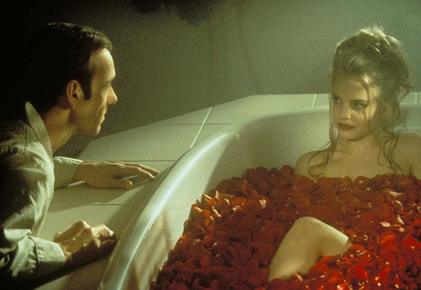 There comes a point, sometimes more often than we would like, when our life settles into complacency. There is no thrill in the morning when we wake to head to work. There is no thrill as we go about our day. Life is simply happening, and we feel powerless to change anything about it. On the plus side this feeling of malaise eventually fades when something exciting arrives and we quickly find ourselves re-energized and ready to take on the world once again. Yet while we find our temporary salvation, we forget that there are others out there just trying to get by, and they seemingly cannot escape their prison of stagnation. It is that premise, with a good measure of how oblivious we are to the lives around us that drives the Academy Award winning film; American Beauty. Lester Burnham is a living ghost. In fact, the daily routine is his only escape from his loveless marriage, estranged relationship from his daughter and the monotony of his job. It seems that there is no hope for Lester, and no hope for his future, until the beauty of one of his daughter's friends captivates him enough to wake him from his walking coma and send him on a path of redemption. 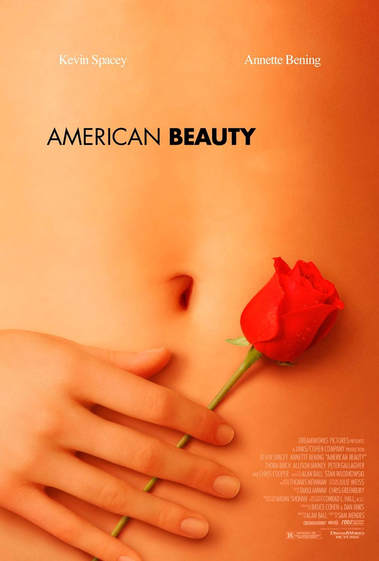 So, make no mistake about it, this is a motion picture that is extremely heavy handed in its message and design. Now before it sounds like I'm about to bash American Beauty, let me make something clear, I commend this film for going that route. In fact, I'm certain that had this film gone the sweet and subtle route it would have been a boring mess. When a film's tagline is 'Look Closer' there is simply no way that you can expect the audience to pick up on subtle clues about what's going on in a person's day to day life because let's face it, we miss all those things now. That's the wonder of this movie. It isn't simply about Lester's redemption or pointing out that we all have to take charge of our lives to be happy. It's also about the ties that bind us and the fact that so often we are oblivious to the hardships and wonders of the lives that surround us. In fact, it almost lends more power to the tragedy of Lester's story because in the end, his malaise spread to his wife and daughter. His life didn't just disappear, he did, and that leaves a sense of pity when the end credits roll. Lester Burnham is a character who at some point I think it is safe to assume was the rock of his family. That his wife and daughter adored him because of his outlook and his energy and when those proverbial dark clouds gathered, they lost their way as well. It's evident with the affair that his wife takes part in and the sour outlook of his daughter. Jane sees no hope for her father, and in turn believes the world has nothing to offer her. Carolyn sees a man who no longer wants to share life with her or be near her and she closes herself off to him and opens up to another man. It's why this story resonates with us so much. Because it does remind us that there is so much happening around us at any given time and that we do need to take a moment and see what exactly is going on. Because just taking the time to notice someone, be it our family, our friends or even someone who is having that bad day, may be exactly what they need to turn their life around. Written by John Edward Betancourt 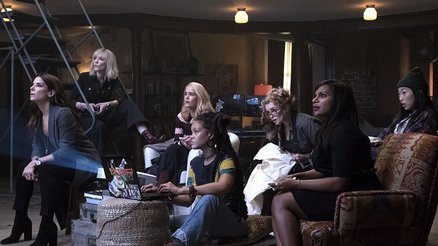 There are few franchises out there as fascinating as the Ocean’s Eleven saga simply because this particular set of tales have turned out to be so incredibly diverse after all is said and done. After all, the original film was a Rat Pack heist flick that actually managed to feature musical numbers before George Clooney ever took on the role, and once it was brought into the modern era it turned out to be a cinematic powerhouse, spawning two sequels off of the 2001 remake thanks its popularity at the box office. So, it came as no surprise to me that eleven years after the adventures of Ocean’s Eleven came to a close that Hollywood would once again try something new with this particular franchise by putting together an all-female cast to pull off a brand new heist free from Terry Benedict and other slimeballs in Las Vegas and I won’t lie, Ocean’s Eight is a motion picture that I’ve been anxious to finally find time to sit down and watch simply because I was dying to know as to whether or not the caper in question and the characters that permeate this new story were going to be as fascinating as they were in previous entries in the franchise. Because let’s be honest, what truly allows for this franchise to endure is the sheer fact it features fun films, ones filled to the brim with dynamic and memorable and quirky characters that we instantly attach to and the heists do matter because they’re always so incredibly complex and entertaining and seeing how they unfold is just as important as those characters and well, we won’t spend too much time talking about the plot today, outside of a couple of key elements that matter from said plot, simply because I want to answer that all important question, as to whether or not this movie can maintain the wonder and continuity of this storied franchise. 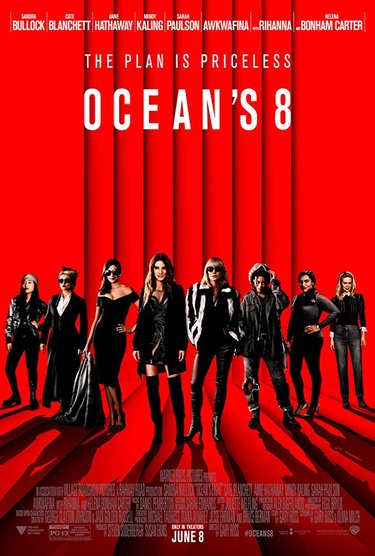 The answer to that question, is a resounding yes, for several reasons. First and foremost, this story does a wonderful job of paying homage to the trilogy that came before it by providing us with the right type of connective tissue since Debbie Ocean is Danny’s sister and rather than ignore Danny’s past or try and move past his gang’s feats, they find a classy and curious way to integrate him and a couple of cameos from the gang into the story seamlessly, allowing for tribute to be paid. But he and his past capers never overshadow Debbie’s journey in this tale and the fact that she is quite the talented thief because the heist she plans is downright magical. For this particular pull, one involving a beautiful diamond necklace, the Met Gala and a doofy actress truly is a delight to watch and quite frankly, this is the most complex lift yet when it comes to the franchise’s storied history and how this new gang executes their incredible payday is fascinating to say the least, since it features all kinds of twists and turns and surprises and what matters most, is that the characters are as dynamic as ever. Ocean’s Eight jell together well on screen and the casting here allows for female actors that we’ve never seen in this type of role to outright shine and each actor brings about unique quirks to these characters giving them life and incredible depth. Of course, none of this works without a stellar cast and you’ll find that here too since Sandra Bullock slays it as Debbie Ocean and she is complimented nicely by Cate Blanchett as Lou Miller, Debbie’s closest friend and partner in crime and really, this movie ends up being an acting clinic, thanks to its female led cast since everyone here contributes to their role and the story with a magnificent zest and zeal and well, I loved this film when all is said and done. It’s a perfect addition to the Ocean’s saga and it does the series proud by yet again offering us something new and exciting and if by chance you haven’t seen this one yet, please do, because it’s an absolutely entertaining ride. Written by John Edward Betancourt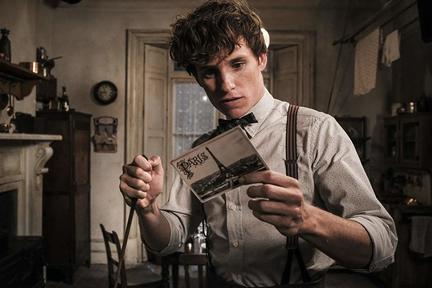 When we think of certain franchises, they immediately remind us of warm childhood memories, specifically the awe and wonder we first experienced when being introduced to said franchise, and we carry that joy with us everywhere we go, and we often discuss with others how every other entry in our favorite sweeping sagas, always manage to recapture the magic and the feel of the first story that we fell in love with. But as time marches on, I’m starting to notice a fascinating trend when it comes to these all-important stories in that, they’re beginning to mature and well…outright grow up. It’s something we saw happen in 2017 with Star Wars: The Last Jedi, since that particular motion picture pushed iconic characters to new heights by having them deal with some surprisingly powerful adult related concepts instead of focusing on the fluffier moments as its predecessors did and I’m also noticing that the Wizarding World of Harry Potter is beginning to grow up as well, at a much slower pace than the franchise set in a galaxy, far, far away of course, but make no mistake about it, the Fantastic Beasts spin off is definitely a more adult themed entry in this universe and the latest release in this storied franchise, Fantastic Beasts: The Crimes of Grindelwald is proof positive of just how far this universe has come storytelling wise. For when I was first introduced to the Harry Potter series of films, it was obvious they were catered to a far younger audience, and they peppered in just a smidge of more mature concepts to keep the parents present in the theater happy and while we did indeed watch Harry grow into a man and a powerful wizard at that, there was a level of gravity missing from the stories, at least for me, and that was something I didn’t find in the series until Fantastic Beasts and Where to Find Them since that particular film felt free of the trappings of Harry’s universe and it was able to explore darker themes and concepts. But it too still had a childlike, uplifting feel to it, which is why its sequel caught me so completely off guard. 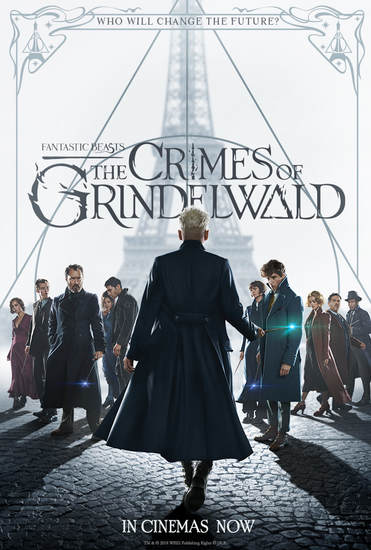 Because The Crimes of Grindelwald dives into some supremely adult concepts, the kind that I honestly didn’t think the saga was capable of digging into. Case in point, the fact that this film removes some of the mysticism surrounding wizards. While they were presented as noble yet capable of mistakes in the Potter series, here they are merely human beings who are in tune with the wonder and power of magic, and they harbor all the flaws that the rest of us do. Some wizards are full of fear and self-doubt in this tale, or they operate in grey areas where tough decisions are made, and this is the first time I’ve found any of characters in this universe supremely relatable and accessible. However, what truly impressed me about this motion picture, is that it found a way to add commentary and relevance when it comes to the modern world we populate since Grindelwald serves as the perfect allegory for how fear controls modern mankind. For his silver tongued speeches and terrifying views of the world help stoke fear in the wizarding community and draw them to his side and well, some of the things he had to say and some of the things he does here are quite reminiscent of the silver tongued, fear mongering snake oil salesmen that run nations and quite frankly, his actions resemble the fears and misinformation we consistently see spread on social media these days since people were clearly quick to absorb and spread Grindelwald’s twisted messages without giving it a second thought. If anything, I have to admit that I found myself supremely impressed with this motion picture. Because this one took some seriously bold chances with this storied and sweeping franchise and in my humble opinion, the gambits pay off. For the chances taken here draw you into the story, and leave you rooting for Newt and his friends to defeat the evil that is clearly taking root with the wizarding community and in all honestly, this is a movie that I likely need to see again, in part to feast upon the incredible visuals, but more so to properly dissect all the messages present in an angry and powerful wizard themed movie, one that tries to warn us that evil in this world sneaks up on us when we least expect it, and it’s up to everyone to fight it when it arrives on our doorstep. Written by John Edward Betancourt 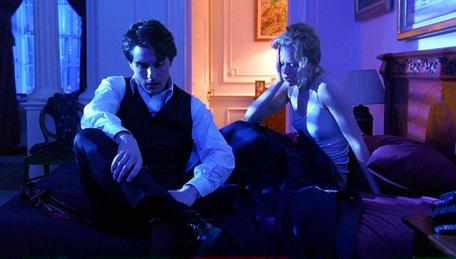 One of the many reasons I’m such a fan of cinema, is the sheer fact that anything and everything a filmmaker puts onto the screen, is open to interpretation. We all find something special when we settle in to watch a movie and while most of us can come to a consensus on what some films generally stand for, it is the ones that continue to confound us that lead to multiple viewings and constant debate and well, this is on my mind today because the final motion picture that Stanley Kubrick ever brought to the silver screen is one that cinema-philes have poured over for nearly twenty years, when it comes to its overall meaning. Because Eyes Wide Shut is truly a fascinating masterpiece, and a fine, yet unexpected end to a storied career and what makes this film so intriguing is the fact that it deals with so many themes and notions that it is difficult to pin down what Stanley wanted to explore in this story, but many firmly believe that is nothing more than an erotic thriller, one that dove deeply into human sexuality and there is in fact, some credence to this analysis. After all, sex is everywhere in this film. It’s on just about every single character’s minds in this story, and the events at the mansion hang heavy over this film since it serves as the penultimate visual when it comes to what these characters desire and it features some odd and twisted and dangerous moments when it comes to sexuality, adding weight to the thriller aspect. But, while it is inherently clear that sexuality is a big-time theme in this film, it stands for different concepts in my mind. Because what I took away from this story is that sexuality and our desires are things that we are in fact still ashamed of, despite how far we’ve come from a progressive standpoint as evidenced by how everyone in this tale works to keep those things a secret. Yet the story was also quick to point out that finding someone else attractive or finding something erotic are natural in their own right, and it can only cause harm if it is going to hurt ourselves or others, like a spouse or significant other, and that it is healthy to explore our libido. But the film also points out the darker side to sexuality as well in that some desires are not healthy in the slightest, and should indeed be shunned, and the best example of that comes about by way of the storyline involving the Rainbow Rental shop owner and his daughter and I would imagine this was included to simply show us that some people cannot resist their desires, regardless of how twisted they may be. 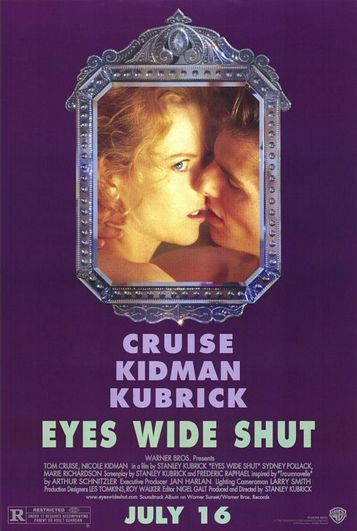 However, while that is plenty to chew upon in this tale, there are plenty more themes to explore in this story, such as the notions of how nothing is ever quite what it seems in life or that some things don’t work out the way we expect them to. Because plenty of characters end up surprising us in this tale when it comes to what they stand for and what they desire, and for that matter, the latter concept is applied to the sexual themes as well since William Harford’s romanticized attempt to have an affair, something that is often portrayed as an easy feat to accomplish in film and television and the written word, ends up falling flat since there is an honest awkwardness surrounding his repeated attempts to find a lover, the kind that remind us of our pratfalls in such matters and perhaps what impresses me the most about this film is the fact that it offers one more important theme to explore; how we are so incredibly insecure when it comes to relationships. All of that is explored by way of William (played brilliantly by Tom Cruise), our main character, since his entire journey into a world of desire is predicated by the fact that his wife has sexual fantasies and dreams that don’t involve him and rather than potentially acknowledge the fact that this happens, William is rattled badly by this admission from his wife, to the point where it is inherently clear that he feels inadequate as both a lover and a husband and that the only way to seemingly repair his fragile ego is to have an affair and feel desired and loved by a woman, only to find himself in what he believes to be a web of intrigue which also relates to insecurity as well. For this strange sex group he stumbles upon is quite worried about having their proclivities exposed and they pretend as though they’ll do anything to keep such matters a secret. In the end however, Kubrick’s career truly ended as it started, by exploring who we are as a species. But the difference here from the first film he dug into such matters with, Dr. Strangelove, is how this particular tale is a far more intimate affair, one that truly makes use of the characters to explore everything he wanted to as opposed to grander concepts and really when all is said and done, this really is a brilliant motion picture. For it truly digs into matters that so many find taboo, and it doesn’t offer any particular message to the audience, or a solution to modern mankind’s problems with sex. It just reminds us of where we stand in this day and age and it’s up to us as to whether or not we accept sexuality for what it is and really, that’s precisely what Stanley achieved over the course of his storied career, he made us think about our world and our society and that’s quite frankly, quite the gift to give moviegoers… Written by John Edward Betancourt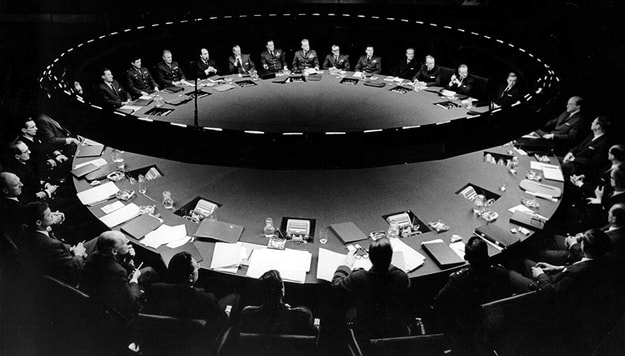 As I begin to wind down my brief retrospective on Stanley Kubrick’s work in cinema, I have to admit to all of you, that I struggled with which film to close the whole thing out with. Because there are so many wonderful movies attached to this man’s powerful genius and taking the chronological route all the way through would allow for some of his other classics to slip through the cracks and well, this retrospective is brief because I really wanted to celebrate his finest works, the ones filed with powerful meaning and since I was a touch lost, I reached out to another Kubrick fan and writer on the site, Scott Murray. Because I really wanted this to pay proper respect to Kubrick and sometimes bouncing ideas off of another fan and writer helps and in talking with Scott it finally hit me. The best way to begin to wind down this ride through Stanley’s mind would be to look not only at the end of his career, but also the beginning. But not the true beginning, not that first director’s credit. No, in order to properly understand the man we have to truly dig into what the artist wanted to accomplish, what he wanted his career to stand for and well, it’s become inherently obvious to me as I’ve re-watched his work that Kubrick wanted to understand the most complex creature on the planet, the one that is capable of great beauty and incredible cruelty; man. And it just so happens his exploration of us began in 1964 with the film, Dr. Strangelove or: How I Learned to Stop Worrying and Love the Bomb. For this magnificent satire, wasted no time in looking at the world as it was in the 1960’s. It was…unsure of itself and full of fear over the possibility that the United States and the Soviet Union would go to nuclear war, especially after the Cuban Missile Crisis and well, the first thing you notice about this film is that Stanley does a fine job of dismissing our fears by way of quirky characters and equally as quirky moments and in a roundabout sort of way, it’s almost as if the movie is reminding us to live each moment to the fullest because we simply never know if tomorrow is the end, and if the end does come, there’s quite frankly, little we can do to prevent it. 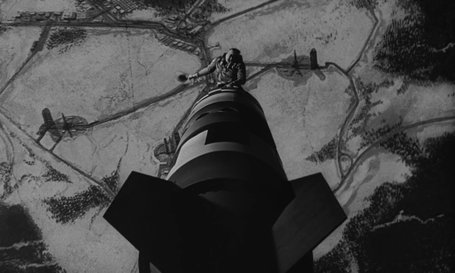 But perhaps what matters more is that Kubrick was also prophetic in many ways when it comes to this film. For many of the satiric themes that Stanley tackled in this film have either managed to come to life in modern day or they still persist. Case in point, the bravado and machismo present from the war room is still around in this day and age, as is the ‘us vs. them’ mentality, which unfortunately has internalized here in the United States and sadly, the whole aspect of conspiracy theorists causing trouble for everyday people in the film has become reality as well in our world with the advent of the Anti-Vax movement amongst plenty of other off the wall notions… However, while all of that is fascinating and chilling in its own right, what fascinates me more, is the sheer fact that Kubrick wasn’t subtle in his commentary in the slightest and while that was likely part of the plan since this movie is pretty wild in its own right, I think it was the easiest way for Stanley to begin his exploration of mankind in the simplest way imaginable. For in future works he would be far more subtle when it comes to his thoughts on humanity and the final motion picture on his resumé is perhaps the finest example of this since Eyes Wide Shut was quite the low key, yet powerful affair and a film that we will visit another day since it will serve as the grand finale to this retrospective. But in the meantime, this is still a film to celebrate from Stanley’s storied career and once one steps away from the commentary and the parallels to our modern world, we are left with quite the entertaining story, one that features some powerhouse and memorable performances and some equally as memorable moments because Slim Pickens riding the bomb all the way down to its target is about as iconic as it gets in cinema. However, I am a more of fan of how this movie vaulted Kubrick into a whole new level of filmmaking, the kind that left us pondering for decades over the meaning of his movies and well, it was quite cool to revisit the genesis of his special brand of commentary. Written by John Edward Betancourt 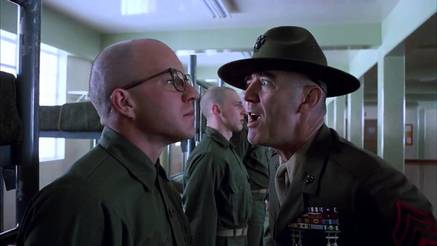 There are many beautiful things about our society, our culture and our species. We celebrate so many wonderful moments in our lives. We celebrate our love, we celebrate our death and so many other moments in between and with good reason, life is worth living. Yet, despite all of our beauty, we are capable of dark acts that in so many ways counteract the beauty, and one such act that can bring out the absolute worst in us, is war. There is no denying it is an ugly and hideous act amongst men, yet it has served its purpose. It was war that brought forth the end of the Third Reich. Yet while that war was celebrated, we lament more recent ones and one such war, the one in Vietnam, became the focus of legendary filmmaker Stanley Kubrick, with his film, Full Metal Jacket. The plot is simple, we are taken through the experience of war through the eyes of Private Joker. We share with him the hardships of boot camp, and the horrors of war and what it truly does to a man, and I'll keep the plot summary that simple because it is just that, simple. Because what makes the film so utterly amazing, is how incredibly brutal it is. The scenes set in boot camp are well...nothing short of terrifying, thanks in part to the ridiculously impressive performance of R. Lee Ermey as Gunnery Sergeant Hartman. Hartman is brutal when it comes to his recruits and acts that likely no longer occur in the U.S. Military leave you sympathizing for these young men, yet at the same time...you understand what the Sergeant is doing. His job is to harden these men, to harness the fury within to make them efficient killers on the battlefield. 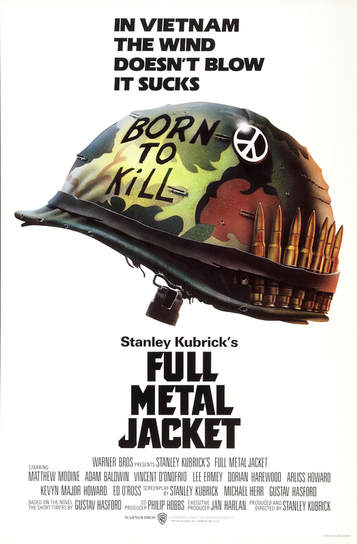 If anything, I would venture to say that the scenes in boot camp are actually more terrifying than the scenes set in Vietnam. Simply because we watch these men change from innocent boys to sophisticated killers and of course, we watch one man break completely. I still cringe to this day when the Soap Party scene comes on in the film, it's utterly heartbreaking and it is the defining moment that snaps Leonard Lawrence at his core. Yet what makes this film so compelling, is that it offers no comfort or solutions about war, it simply offers it for what it is...a bloody and violent mess. Sure, there are elements to be found here where one can form an opinion as to whether or not war is good or bad for our species because Stanley Kubrick was smart enough to know that a good chunk of the audience would be expecting the film to nourish a pre-conceived notion in their mind. But rather than make that the sole focus of this masterpiece, he instead gave us the side of war we rarely see, the human element. Full Metal Jacket reminds us of one raw fact. These are people, just like you and me that are trained and asked (or in this case, ordered) to fight a war. They will kill other human beings, and they will suffer, and they will hurt for being forced to do something so extreme...and that's really all there is to it. If by chance you haven't seen this film, make it a point to do so as soon as possible, for this motion picture is brilliant, visceral and angry and it will take you for one hell of a ride. Written by John Edward Betancourt 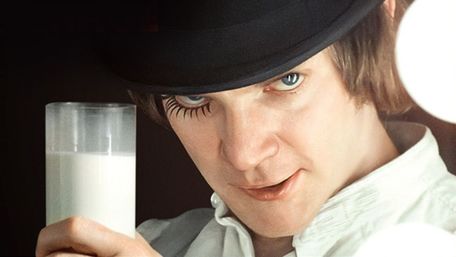 Sometimes when you try and watch a classic film objectively and try to steer clear of analyzing the themes and concepts that have been examined by so many others when it comes to said film, you realize…there’s simply no way that you can avoid them. Because sometimes, movies are meant to say something about our world and our species and those of us who want to absorb that message pay close attention to it and well, I came to discover that avoiding the deeper themes present in the next movie in my Kubrick Retrospective would be a fool hardy attempt and I instead embraced everything that A Clockwork Orange had to offer. Which quite frankly, I found fascinating. Because in all honesty, this is a film that I don’t revisit of his all that often since it outright makes me uncomfortable with its extensive scenes of violence and torture and rape and well, that’s really the first thing that makes this movie so compelling in its own right, in that it evokes a sense of terror and dread in our hearts when we watch it, drawing us into the story by making this story a train wreck of sorts, that type of mess you simply cannot look away from even though you want to and well, once one gets past the harsher aspects of this film, that’s where its true power awaits us since in essence, this movie is nothing more than a powerful commentary on mankind’s relationship with violence. Yet what impressed me the most about said commentary, is not that it pointed out that we are violent creatures by nature, because that would simply be too easy. No, what makes this film so fascinating is that it takes the time to deeply examine the duality of man and how we view violence as a bad thing, only when it suits us. Now, this is something that is accomplished by way of a long con so to speak, since we spend a lot of time with Alex and his Droogs and bear witness to their all of their terrible acts so that we in fact hope that at some point, Alex is brought to justice, in order to pay the penalty for his crimes because clearly, he’s an awful person right? He’s a thug, a miscreant and a monster and must face justice. 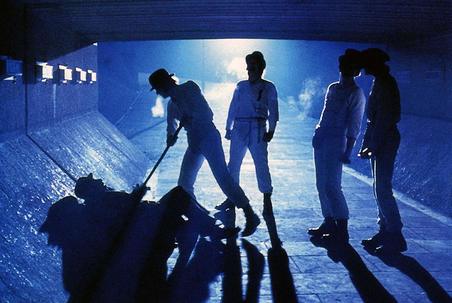 But that is merely the setup to the point. Because while Alex has done some awful things, and indeed needs to repay his debt to society, the audience is left in a strange place when it comes to how exactly he is made to do just that. For in essence, Alex is tortured while in prison and there’s little that anyone can say to sway my opinion on that because the whole sequence where his eyelids are forced open and gently wet so that he can witness violent acts in order for the drug to take hold is downright twisted, as is the presentation to show that he’s cured and well, once that torture is complete, the movie can get down to business and reveal its point about mankind and our views on violence. For once Alex is released from prison and makes the attempt to restart his life as a functional member of society, he faces nothing but cruelty at every single turn. His parents have turned their back upon him, his old gang is happy to make his life hell in their new roles as police officers and someone he made suffer badly, is keen to play a game of ‘eye for an eye’ and well, that’s quite the twist when all is said and done. Because it shows us how we are happy to resort to violence in the name of ‘justice’ or to make us whole again and that when we do resort to it, we’re no better than those we judge for it and that cycle of violence and our inability to rise up from it, is what makes our species so incredibly flawed and so incredibly stagnant at times and well, any way you slice it…this movie is downright brilliant. In part because it holds nothing back since we are privy to some supremely twisted sequences of violence at just about every single turn, but mostly because of this subtle examination, one that you have to truly focus upon since Alex’s story is handled at first glance in what appears to be a ‘laisse faire’ style. But make no mistake about it, this is Kubrick’s rumination on who we are as a species, and he offers no easy answers on how to fix our problems, he just wanted to acknowledge our cruelty and he does it well here and this film once again proves Kubrick’s outright genius and oddly enough, this slice of real world horror, would seemingly put a seed into Stanley’s mind to expand upon the notion of fear when he settled in to direct a little movie known as…The Shining... Written by John Edward Betancourt 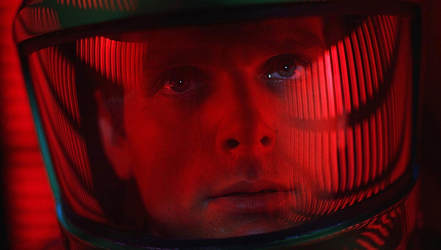 When we talk about careers as a whole, we often talk about the hard work that goes into them, and how people who choose a specific field need to hone their skills and their craft in order to become a master at what they do. Yet while that is important advice, sometimes it’s necessary to acknowledge the fact that some people are outright made for their respective career fields and excel in them from the get-go and when it comes to cinema, one person who was truly born for the industry was the late and incredible Stanley Kubrick. Because his ability to understand the medium, and how movies should be made, allowed for him to create some magnificent motion pictures, the kind that we revisit time and time again because there’s something new to be found every single time we settle in to enjoy them and well, seeing as to how I’ve been on quite the cinematic kick as of late in my spare time, several of his films have been finding their way into my Blu Ray player and well, I thought it would be fun to kick back and highlight some of my favorites when it comes Stanley’s body of work, starting with the 1968 classic, 2001: A Space Odyssey. Now, before we dig too deeply into this retrospective of his work, let me pause and say that I will do my best to not cover elements that others have written about in detail when it comes to his films. Because there have been plenty of articles over the years that try and uncover exactly what message or notion Stanley was trying to convey, and honestly, with some of these stories, I’d rather just appreciate them in simpler fashion. And for the sake of today’s review, we won’t discuss the plot, because if you’re here, you’ve seen this movie and if you haven’t, get on that. Instead, today I want to talk about two key elements that wow me every time I watch this one; the fact that it is outright art, and Stanley’s perspective on man and technology. 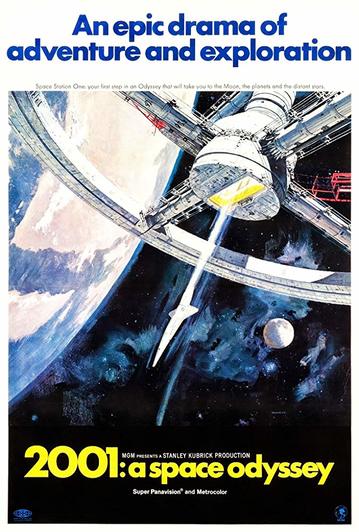 In fact, let’s start there, since such a topic seems nearly hypocritical in nature since I promised to not dig into this move too deeply. But what blows me away when it comes to this part of the film is the sheer fact that it doesn’t offer commentary or deeper meaning on this matter. Kubrick simply envisioned a world as it is today, where technology and mankind are in essence tied at the hip and we complement one another in every sense of the word since our lives are easier with technology at our fingertips and it needs us to exist and the symbiotic relationship here, and the humanity that the HAL 9000 exhibits is eerie and prophetic and I’ve always appreciated how Kubrick saw this without blending some kind of warning into the fabric of the film. Yet, it is that very technology and its appearance that quite frankly, lends credence to the artistic look and feel of this movie since it is in many ways, a painting that comes to life for two hours because my goodness, the visuals here are just breathtaking and I love how Kubrick takes us from our messy and violent beginning from eons ago to a sanitized and carefully curated world filled with technology that allows for travel to the stars and really, these visuals consistently take my breath away. They’re simply unrivaled in cinema, and I’ve yet to find a single director who has been able to replicate the look of this film in the slightest, and many have tried but this movie really is a true work of art visually and well, one simply cannot re-create something this perfectly curated when all is said and done. But despite those two fascinating elements, one cannot forget that there is also a quality story to be found here as well since it does give you characters you’re invested in, an adventure for the ages and the whole notion of the Monolith and what it stands for is intriguing to say the least and really, this one has a fond place in my heart simply because this is a movie that I saw in my younger years and it allowed for my imagination to go to incredible places since it inspired me to seek out more science fiction and well, it’s simply a magnificent film from a magnificent director, one who was able to branch out in cinema and do anything with a story… |
Archives
March 2025
|
|
© 2012-2025, Nerds That Geek LLC.
All Rights Reserved. |
uWeb Hosting by FatCow


 RSS Feed
RSS Feed